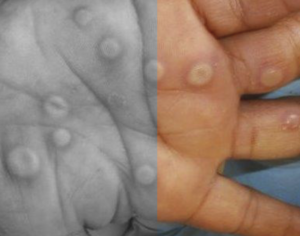Detailed results from PALM007 study: no clinical impact of tecovirimat against mpox clade 1
6 January 2025. Related: mpox, IDWeek 2024.
Simon Collins, HIV i-Base
 Although for the last two years tecovirimat has been recommended as a treatment for severe mpox based on activity in animal and in vitro studies, two randomised controlled human studies recently closed earlier than planned due to the lack of clinical effect.
Although for the last two years tecovirimat has been recommended as a treatment for severe mpox based on activity in animal and in vitro studies, two randomised controlled human studies recently closed earlier than planned due to the lack of clinical effect.
Very limited data were included in press statements for the PALM007 and the STOMP studies in October and December 2024, respectively. However, top-line results from PALM007 were presented by Olivier Tshiani from the US National Cancer Institute at IDWeek and are reported below. [1]
PALM007 was designed in November 2021 before the global clade 2b epidemic of 2022/23 and started to enrol in October 2022 in two sites in East Congo.
It was a randomised placebo-controlled study with a primary endpoint of time to lesion resolution with secondary endpoints that included mortality, clinical severity, duration of symptoms, safety and PCR viral suppression. All participants needed to be hospitalised for 14 days treatment and received the current standard of care plus were randomised to either tecovirimat vs placebo, stratified by whether symptom onset was less than (~80%) or more than (~20%) 7 days previously.
From 7 October 2022 to 9 July 2024, the study screened 793 people with suspected mpox clade 1 (with 616 confirmed PCR positive) and randomised 597 of those positive to tecovirimat (n=295) or placebo (n=302). Baseline characteristics were broadly similar between arms with overall mean age 16 years (range 0 to 71), with 64% aged between 2 to 18 years and 49% were women.
Mean (range) number of lesions however was 487 (range: 1 to >10,000). Although roughly 20% of people had malaria coinfection, less than 1% were living with HIV. Roughly 82% had good nutritional status, in 12% this was moderate and 6% had severe acute malnutrition.
For the primary outcome, there was no overall difference between arms in the time to lesion resolution, irrespective of whether onset of symptoms was less than or more than 7 days earlier.
However the definition of resolution is unclear given the extensive number of mean lesions.
Overall, mortality at day 28 was 1% vs 1.3% (3/295 vs 4/302) in the active vs placebo arms respectively. Rates with earlier use (symptoms <7 days) were 0.9 vs 0.8% vs 1.6% vs 3.2% with later use (symptoms >7 days). Mortality was slightly higher at day 56 with 5 deaths in each arm, 1.3% with early use vs 3.3% with later use, but with no differences between active and placebo groups.
There was no difference in outcomes among the 8 women in each arm who were pregnant, with 50% in each arm leading to live births.
There were also no differences in the percentage of participants testing PCR negative in blood, oropharynx or lesion samples at day 14 or at earlier time points.
comment
These results are really disappointing given the strong in vitro and animal data showing activity against mpox. [2, 3, 4, 5]
Full results from PALM007 are currently in press and top-line results from STOMP will hopefully be presented at CROI 2025 if accepted.
This leaves little public data and many recent papers reported benefit from observational studies.
The situation is further complicated by the manufacturer Siga Technologies reporting potentially more positive outcomes than the NIH announcements and publicising that Japan just approved tecovirimat for mpox. [6, 7]
As tecovirimat was licensed for mpox in the UK in 2022 and in the EU in 2023, with a caution about very limited data, the Japanese decision might just be late and might be reevaluated now. If this is the case then SIGA would be opportunistically issuing misleading information.
Given mpox is still an ongoing crisis and designated by WHO as an international public health emergency, it would help if detailed datasets from such important studies would be made available earlier.
During 2024, a total of 17,602 PCR-confirmed cases have been reported from 10 states in the WHO African region, including 60 deaths. [8]
NOTE: full results have since been published in NEJM. [9]
References
- Tshiani O et al. Tecovirimat for the treatment of Mpox: A Randomized Placebo-controlled Trial in the Democratic Republic of the Congo (PALM007). IDWEEK 2024, Los Angeles. 17 October 2024.
idweek.org -
Grosenbach DW et al. Oral Tecovirimat for the Treatment of Smallpox. N Engl J Med 379 (1)44-53. DOI: 10.1056/NEJMoa1705688. (4 July 2018).
- Postal J et al. Antiviral activity of Tecovirimat against Mpox virus clades 1a, 1b, 2a and 2b. bioRxiv preprint NOT peer-reviewed, (23 December 23, 2024).
doi.org/10.1101/2024.12.20.629622 - Postal J, Guivel-Benhassine F, Porrot F, Grassin Q, Crook JM, Vernuccio R, Caro V, Vanhomwegen J, Guardado-Calvo P, Simon-Lorière E, Dacheux L, Manuguerra JC, Schwartz O. Antiviral activity of tecovirimat against monkeypox virus clades 1a, 1b, 2a, and 2b. Lancet Infect Dis. 2025 Jan 23:S1473-3099(25)00014-3. doi: 10.1016/S1473-3099(25)00014-3.
https://pubmed.ncbi.nlm.nih.gov/39864448/ - Tecovirimat news continues: Japan approval includes mpox indication. (HTB 2 January 2025).
i-base.info/htb/49950 - Lack of tecovirimat activity against mpox clade 1. HTB (21 October 2024).
i-base.info/htb/49171 - WHO African Region. Mpox in the African region. External weekly situation report. (22 December 2024).
iris.who.int/bitstream/handle/10665/379982/AFRO-Mpox%20bulletin-%2022%20December%202024.pdf - Tecovirimat for Clade I MPXV Infection in the Democratic Republic of Congo. N Engl J Med 2025;392:(15);1484-1496. (17 April 2025).
https://www.nejm.org/media/doi/full/10.1056/NEJMoa2412439

